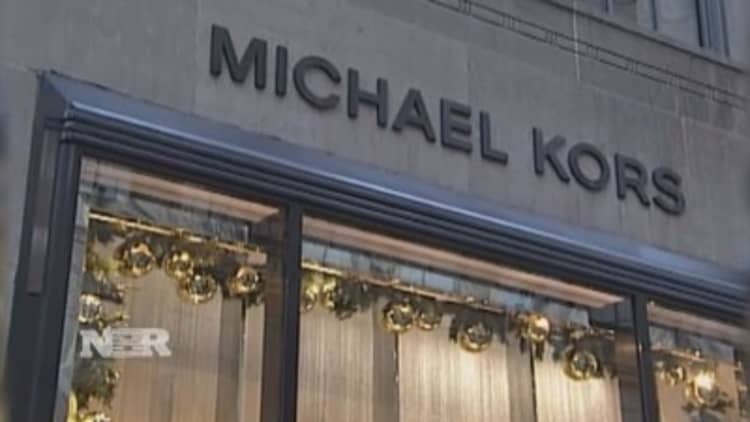
Michael Kors stock has had a fabulous run, but investors' opinions about whether its shares are about to go out of fashion may hinge on two questions: Has the brand maxed out its U.S. potential? And how much of a boost can it get from expanding in Europe?
There is no doubt that the pace of both Michael Kors' revenue growth and its stock gains look difficult to sustain over the long-term. Quarterly revenue has grown an average of 55.6 percent year over year since going public in December 2011, according to Thomson Reuters data. Meanwhile, shares have soared 312 percent over that same time period. Given that the stock is down 18 percent since it touched its all-time high of $101.04 on Feb. 25, some analysts are expressing concern over the once high-flying stock, while others continue to defend its trajectory and see its current weakness as a reason to buy.
"When you think about the growth over the past two years, it's been fairly unprecedented," said Barclays retail analyst Joan Payson. "We really don't have much to compare it with within the space that could indicate whether there has been a bubble or not."
Michael Kors' growth has been fueled by the brand's expansion, but analysts are concerned the label has reached its saturation point in North America. They fear that inventories are too high, and that will lead to compressed profit margins and lower earnings.
Payson recently lowered her price target on Kors shares to $82 from $85 and reiterated her "underweight" rating. Sterne Agee analyst Ike Boruchow took his price target to $92 from $100, but maintained a "neutral" rating. Boruchow said he expected sales would remain strong but the increased promotional offers he has seen will put pressure on profit margins.
In a recent note to investors, Wells Fargo analyst Paul Lejuez said "Coach's fall from grace makes us more cautious about Kors." Lejuez lowered his target range for Kors shares to to $92 to $96 from $96 to $100.
Read MoreMichael Kors stock not as haute as before
Citigroup's Oliver Chen also recently lowered his price target on the company, from $107 per share to $98. According to a survey conducted by Citi, Chen predicts Kors' June sales were up 7.8 percent, a deceleration from April's 15.2 percent growth and May's 13.7 percent growth.
William Blair analyst Amy Noblin downgraded her recommendation on Kors from outperform to market perform, telling investors the premium brand's sales will struggle to sustain its currently high valuation.
However, analysts at both Piper Jaffray and Canaccord Genuity recently put out notes reiterating their respective "overweight" and "buy" ratings on Michael Kors shares.
Read MoreExpect to spend more on back-to-school
"[Michael Kors] continues to be a global growth story, that we think is grossly misunderstood by the street," said Erinn Murphy, of Piper Jaffray. "It's growing across multiple categories, and we think over the next two to three years, the near-term, or that kind of intermediate term, upside really comes from the European market, what they are doing there, it's extremely transformational."
Murphy said her team's channel checks indicate Kors will post triple-digit-sales growth in Europe for the current quarter.
Barclays' Payson also said she expects Kors' European sales to grow rapidly over the next two years to potentially $1.2 billion. However, she sees a number of risks to the brand's overall business right now, including a decline in North American market share. This is a big concern given that the region is responsible for 80 percent to 85 percent of the company's total sales.
Read MoreWhy Gen Z may mean trouble for retailers
"We really see [Michael Kors] as having 18 percent market share in North American handbags at this point. Twenty percent is really the threshold where we would be beginning to be concerned that they're beginning to demonstrate a saturation point in the market," Payson said.
Google Trends search data in the U.S., which may be a way to gauge consumers' interest in the brand, could also signal trouble. According to Payson, searches for the term "Michael Kors" have declined for five straight weeks beginning in early June. Payson said the only other time Google Trends search data showed a week of decline since the company's IPO was in November 2013.
—By CNBC's Courtney Reagan.


